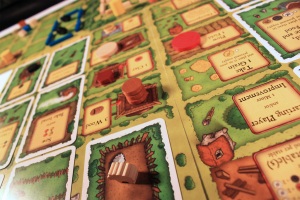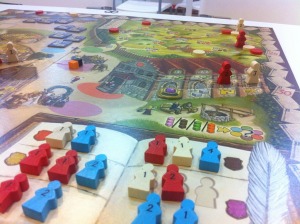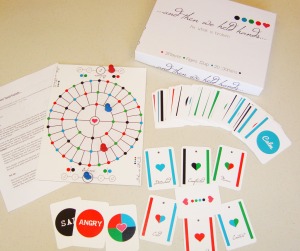
Sex on the (Game) Table
I’m going to pivot here from the past two weeks, away from 2000 word theoretical arguments and critical close readings to something a little bit looser. In the process, I also hope to turn away from the world of video games for a little while and towards the cardboard world of the table top. If you’ve been into your local Barnes & Noble on any given day in the past few years, you may have noticed the sudden appearance of board games where before there were only college application guides and Moleskine notebooks. This, I promise, is not just indicative of B&N’s own post-codex marketing strategies. They say we are in the middle of a board game renaissance, a golden age of plastic figures, complicated rulebooks, and wooden cubes, and that makes me one happy little nerd.
Incidentally, it also makes me one happy little student of sex and gender politics.
For scholars of gender and sex in a society like ours that has, for much of its history, depended on the institutions of marriage and family to generate a dominant source of individual and corporate identity, understanding the way these institutions work, their social effect, and the conditions under which they break down is essential. This goes doubly true for those who have been marginalized or harmed over and over by these deeply engrained institutions. If you were a film scholar with an interest in sex and gender politics, you’d likely spend time examining the visual representations of familial love, coded femininity, or censored scenes of illicit sexuality. Likewise, were you to take Victorian literature as your subject, you’d probably reading all of Foucault, historicizing sexual practices of the 19th century British subject, while close reading Dickens for signs of the emerging middle class family unit.
Rather, games are machines, encapsulated collections of rules that produce incredible pseudo-fictional experiences when activated by players. Games are adept at modeling the social and political systems in which we already live. This is as true of board games as video games, and it is why the resurgence of board games ought to excite anyone with even a passing interest in the operation of sex and gender in Western culture. Where films and books represent gender and sex ideologies by conventions of narration, image, and characterization, board games offer up for examination the very systems within which these ideologies circulate. This allows players to discover, interact with, and even enact models of those systems, opening institutions like marriage and the family up to a different and (dare I say it?) fun kind of analysis.
So, as both an indulgence of my nerdy enthusiasm for tabletop gaming and an instance of the capacity of board games to represent the dynamics of gender, sex, marriage, and the family, I offer below a few examples for your consideration.
Photo Credit to Board Game Point of View on boardgamegeek.com
Agricola
Agricola is an intimidating beast of a game to the uninitiated. It’s a quintessential example of the “Euro” style board game: relatively little direct player interaction, multiple paths to victory, heaps of victory points to be won, and copious wooden blocks. In this game, players take responsibility for small 17th century farmsteads, competing with each other to establish the most diverse, fruitful farm. On their turns, players place one of two “workers” from their farm board on one of the action spaces in the shared, central board. Being a 17th century farm, the labor is pre-industrial which means your “workers” are actually husband and wife. This is a case of pure abstraction in terms of representation; the agrarian couple are in fact nothing more than flat wooden discs. They have no visible gender difference, nor are they functionally different with respect to the kinds of actions each one can take. If they are a heterosexual couple as the game’s rulebook assures us they are, there are no representational markers to support such a case. However, as a game of Agricola plays out, two new action spaces open up, each called “Family Growth.” Here, players can assign one of their workers (presumably the wife) who then returns home to the farm bearing a third wooden disc – a child. The arrival of a new child is one of the most exciting events Agricola can offer players, not however because of the miracle of childbirth, but because it means that player now has one more worker that can be sent into the fields, giving them a tremendous competitive edge over her opponents. This wooden child seems to verify that yes, indeed, the first two workers were indeed man and wife, but after the child’s arrival, all three workers once again melt into interchangeability. These bodies are as abstracted, as ungendered as you might imagine – and yet the game’s mechanics testify to the sex that is nevertheless always at the core of a winning strategy. Agricola then offers players a family unit rooted in heterosexual marriage, but radically flattened of sexual difference by the demands of production. Agricola strips marriage and sex down to its most basic, agrarian, function: securing resources, staving off starvation, and producing enough surplus to overshadow your neighboring farms.
Photo Credit to Chun Yian on boardgamegeek.com
Village
Village is another game set in the pre-industrial past, as well as another example of a Euro game with an emphasis on the family unit. However, where Agricola explores the relationship between familial fertility and productivity, Village explores the relationship between family legacy, death, and cross generational ties. More mechanically complex than Agricola, Village makes use of some similar ideas: players have a homestead board from which they place family members onto a central action board and it’s possible for players to “have babies” in order to generate more workers. However, these workers are each labeled with a number, 1-4, indicating to which generation they belong. Players place their workers onto the various actionable spaces of the main board, and in many cases, leave them there, for the spaces are occupations that their workers hold until they die. Say you’re playing Village and you need to make a wagon to sell at market. You could pay a hefty price in various resources and gold or, if you have a worker at the wainwright location, you could simply spend a bit of time, the game’s third spendable commodity. As players spend time, however, workers from the older generations begin to die off. Workers, on the occasion of their deaths, are sent to graves that match their lifelong occupation and in this way are committed to the village’s book of records, memorialized forever after. However, should the limited number of places for a worker’s given occupation be filled up, they are sent unceremoniously into an unmarked grave, forgotten forever and, crucially, giving the player no points. Rather than incentivize the growing accumulation of labor as Agricola does, Village encourages players to look forward to the proper memorialization of death, for it is in this memorialization that the legacy of their family is secured against those of their opponents. Tellingly, the rulebook calls the score “Prestige Points.” It is expressly for the garnering of that prestige that the family unit exists in the world of Village.
And now for something completely different…
Consentacle
In a very sharp turn away from the pastoral, picturesque worlds of Agricola and Village, I’d like to introduce you to Consentacle, a game by designer, Naomi Clark that is, as of yet, still unpublished. Unlike the previous two games which you can order right off of Amazon, Consentacle was never intended to be a mass market game. This game takes as its subject the erotic encounter between a young, “Curious Human” and a rather expressive “Tentacled Alien.” Consentacle is all about the complex negotiation of sexual consent as players work together to generate Trust, gain Satisfaction, and hopefully, build Intimacy between their wildly disparate characters. Visually, the Curious Human and Tentacled Monster are as different as can be, though any potential sense of horror that you might expect is mitigated by a charming, Jet Set Radio Future, comic-y art style. Mechanically, this difference is reinforced by limiting communication between players as they work toward a common goal, encouraging a sort of blind, tentative play style. On their turns, players simultaneously play cards like “WINK,” “BITE,” “STROKE,” or “ENVELOP,” trying to create combinations that lead the Curious Human and Tentacled Alien into a memorable erotic encounter. I say memorable because the goal of the game isn’t solely to achieve Satisfaction but to transmute that Satisfaction into something more. Satisfaction is actually only the middle step along the road, a sort of exchange gate through which Trust must pass in order to become Intimacy. This alchemy whereby Satisfaction transforms Trust into Alchemy is the key to Consentacle’s representation of sex, not as an end to itself, nor as the component of some larger, marital or familial institution, but as a crucial form of relation that bridges the wide gulf between individuals. In a representational fiction that draws explicitly from an erotics of difference that is often figured as inherently violent (feel free to Google tentacle porn if you’ve missed the allusion), Consentacle removes the power inequities that seemed to be inherent in an encounter between ingénue and monster and replaces them with the erotic frisson of cooperative consent. In other words, sex is fun! And, when sex is properly fun, it is egalitarian, given over to a free exploration of difference, and the magical reagent that brings Intimacy where before there was only solitude.
Photo credit to Andrew Tullsen on boardgamegeek.com
…and then we held hands
I’ll wrap up with another cooperative game where players must cope with limited communication and blind play in order to achieve a relational end. In …and then we held hands, two players take on the roles of lovers who have reached a point of crisis in their relationship. The nature of this crisis is left to the imagination, but in order to resolve it, players must navigate their pawns across colored spaces on a board arranged in concentric circles. As players discard emotion cards from either their hand or their partner’s, they gradually try to move toward the center of these circles, achieving balance and resolving their relationship in the process. …and then we held hands, is a quiet, deeply abstracted game, unlike Consentacle, and yet an intensely evocative one. The emotions in the game are represented by one of four colors that make up the board’s spaces as well as the emotion cards in player’s hands. Discarding the emotion cards suggests the emergence of feeling in the course of discussion or argument between two lovers and, correspondingly, it affects the position of the player’s pawn. If players handle each other’s (and their own!) emotions appropriately, they slowly make progress toward each other – but should they ignore the feelings in play they risk running their pawn into an impossible corner, unable to move within the context of that relationship anymore. Again, like in Agricola, …and then we held hands, seems gender agnostic, though it also seems to invite players to approach the game as a couple, extra-diegetically. And indeed, the game has been discussed in various contexts online as a “couple’s game”. However, the absence of representational gender here suggests, like Consentacle, an egalitarian sort of cooperation, one that requires sympathy, the reading of body language, and careful consideration of your partner’s state of mind. Where Consentacle is all playful eroticism, however, …and then we held hands plays more like a meditative, couples’ therapy session. The mechanics here are simple and though abstracted, clearly linked to ideologies of egalitarian coupling. It is exactly that abstraction, however, that renders …and then we held hands so open to projection. This is a game, it seems, in which players are invited to invest their own relational crises and contemplate for thirty minutes how they can better cope with the complex roil of emotions that come with the sexual territory.
And that’s it for now! This was just a very cursory overview of how board games offer small windows on the way our society has conceived of sex, marriage, and gender. So much more could be said about each of these games and the many others that I don’t have room to mention. If we really are in the middle of a board game renaissance, I hope we can recognize their value as microcosms of our own social lives as gendered, sexual bodies.
Jordan Wood is a Ph.D student in the Syracuse University English department where he studies games, sexuality, and queer theory. He lives with two cats and is terrible at side scrolling games. Go Bills.
You may also like
Related
No comments
Archives
- April 2025
- March 2025
- February 2025
- September 2024
- February 2024
- January 2024
- October 2023
- May 2023
- March 2023
- February 2023
- December 2022
- November 2022
- October 2022
- May 2022
- April 2022
- March 2022
- February 2022
- December 2021
- November 2021
- October 2021
- June 2021
- May 2021
- April 2021
- March 2021
- March 2020
- February 2020
- December 2019
- November 2019
- October 2019
- September 2019
- August 2019
- April 2019
- March 2019
- February 2019
- January 2019
- December 2018
- November 2018
- October 2018
- September 2018
- April 2018
- March 2018
- February 2018
- January 2018
- December 2017
- November 2017
- October 2017
- September 2017
- May 2017
- April 2017
- March 2017
- February 2017
- January 2017
- December 2016
- November 2016
- October 2016
- September 2016
- April 2016
- March 2016
- February 2016
- January 2016
- December 2015
- November 2015
- October 2015
- September 2015
- May 2015
- April 2015
- March 2015
- February 2015
- January 2015
- December 2014
- November 2014
- October 2014
- September 2014
- August 2014




Reblogged this on Queerly Different.